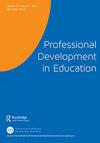Laying a foundation for critical professional development through a research–practice partnership
IF 3.1
3区 教育学
Q1 EDUCATION & EDUCATIONAL RESEARCH
引用次数: 1
Abstract
ABSTRACT Much of the formal professional development teachers experience consists of short-term workshops that maintain – rather than disrupt – the systems of power that reproduce educational inequities. In response, some scholars have advocated critical professional development (PD) as a means of supporting teachers’ interrogation of these inequities and empowerment to effect change. Critical PD is based on Paulo Freire’s ideas of dialogue, problem-posing, and praxis, and it tends to emerge within grassroots organisations that function independently from the school systems. There are two drawbacks to this autonomous structure, however: the legitimacy problem, or the fact that the pedagogies advocated within these groups may be difficult to implement without the institutional support of participants’ districts; and the resource problem, or the fact that teachers’ time and efforts within these independent organisations is typically uncompensated. In this essay, we describe a research – practice partnership in which we co-developed critical PD on culturally responsive teaching with district leaders. The form of the PD, critical action research, allowed the participants to engage in problem-posing and praxis in order to analyse systems of power and their own positionalities within these systems. Recommendations for those with and without access to research – practice partnerships are offered.通过研究与实践的合作关系为关键的专业发展奠定基础
摘要教师的大部分正式专业发展经历都是短期研讨会,这些研讨会维护而不是破坏了再现教育不平等的权力体系。作为回应,一些学者主张批判性专业发展(PD)作为一种手段,支持教师对这些不公平现象的审问,并赋予教师权力以实现变革。批判性PD基于保罗·弗雷尔的对话、提出问题和实践理念,它往往出现在独立于学校系统运作的基层组织中。然而,这种自治结构有两个缺点:合法性问题,或者如果没有参与者所在地区的制度支持,这些群体内倡导的教学法可能很难实施;以及资源问题,或者教师在这些独立组织中的时间和精力通常是无偿的。在这篇文章中,我们描述了一种研究-实践伙伴关系,在这种伙伴关系中,我们与地区领导人共同开发了关于文化响应教学的批判性PD。PD的形式,即批判性行动研究,允许参与者参与问题提出和实践,以分析权力体系及其在这些体系中的地位。为那些有机会和没有机会获得研究-实践伙伴关系的人提供了建议。
本文章由计算机程序翻译,如有差异,请以英文原文为准。
求助全文
约1分钟内获得全文
求助全文
来源期刊

Professional Development in Education
EDUCATION & EDUCATIONAL RESEARCH-
CiteScore
6.30
自引率
4.80%
发文量
27
 求助内容:
求助内容: 应助结果提醒方式:
应助结果提醒方式:


